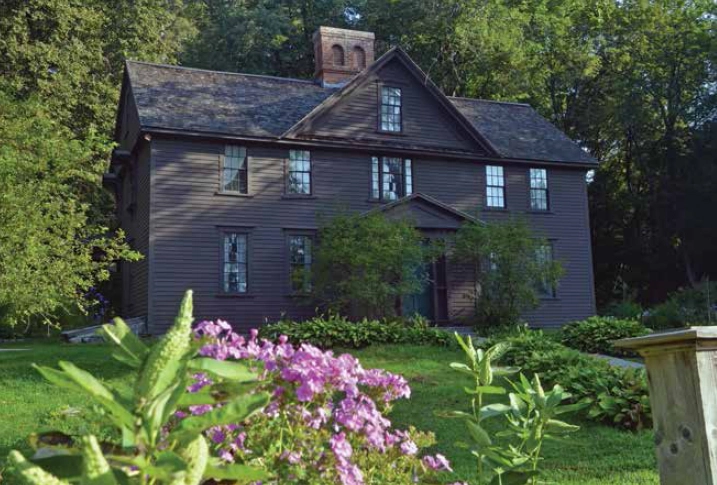Louisa taught school, worked as a governess, took in sewing, and, for a pittance, sold her early short stories to magazines. Anna also taught and cared for other people’s children. In addition, she became Louisa’s great “bosom friend and comforter.”36 Lizzie, already a confirmed homebody, became “our little housekeeper,—our angel in a cellar kitchen,” freeing her mother to open an employment office in Boston, thus adding some more desperately needed dollars to the family coffers.37 Still too young to work outside the home, May attended school, won prizes with her drawings, and studied to become a teacher. Though there was already little enough to go around, the Alcott home became a refuge “for lost girls, abused women, [and] friendless children.”38 In 1855, when the family took lodgings on Pinckney Street, Louisa often retreated to the house’s garret, where she would sit “with my papers around me, and a pile of apples to eat while I write my journal, plan stories, and enjoy the patter of rain on the roof, in peace and quiet.”39 Already, as she later realized, Alcott had become the prototype for “Jo in the garret.”40 Together, the four Alcott sisters gave life to their father’s observation, “Family is but the name of a larger synthesis of spirits.” 41 With a powerful sense of his daughters’ firm unity, Bronson called the four of them “the golden band.” 42
If the support of her family was Alcott’s greatest comfort during the lean years of her late teens and early twenties, the potential loss of that stasis and stability was her besetting dread. The fear began to become real in the summer of 1856. The Alcotts had recently left Boston for the more bucolic Walpole, New Hampshire. There, true to their charitable habits, they befriended an impoverished family, the Halls, who would appear in Little Women in more germanized form as the Hummels. The Halls’ poverty was less genteel than that of their fictional counterparts; they lived above a cellar that was used as a pigsty. Alcott was working in Boston when her mother, Lizzie, and May began tending to the Halls’ sick children. She returned home to find Lizzie desperately ill with scarlet fever. Lizzie survived the initial ravages of the disease, but the fever weakened her permanently. Alcott did all she could for her stricken sister. Lizzie’s collapse struck her as if it had been an attack on the entire family. Though it was not her habit to pray in words, she called upon God to “help us all, and keep us for one another.” 43
For a time, Lizzie rallied. However, a year after the initial infection, Alcott told her journal, “I fear she may slip away, for she never seemed to care much for the world beyond home.”44 By September 1857, Lizzie was failing fast. In the midst of her illness, Bronson Alcott chose again to move the family, this time back again for a third sojourn in Concord. This time, for the grand sum of $945, he purchased a hundred-fifty-year-old house on Lexington Road, a short walk westward from the Hillside house that had housed his family a decade earlier. Because the property featured at least forty apple trees, he christened his new home Orchard House. The structure was too dilapidated for immediate occupancy. Thus the Alcotts settled briefly into a house on Bedford Street to wait for the needed repairs to be done. Lizzie did not survive the wait. In early March 1858, she set aside her sewing needle, saying it was “too heavy” for her.45 On the fourteenth, at three in the morning, Lizzie Alcott passed away. She was not yet twenty-three.

Orchard House in Concord was the Alcotts’ home from 1858 to 1877. Designated as a National Historic Landmark in 1962, it continues to serve as a mecca for those who love Alcott, her writings, and her family. (Louisa May Alcott Memorial Association)
Alcott wrote a poem in Lizzie’s memory—a verse that she revised for inclusion in Little Women, in the chapter in which Beth dies. There was a stanza in the original poem, however, that Alcott did not publish, but kept quietly to herself:
Gentle pilgrim! First and fittest,
Of our little household band;
To journey trustfully before us
Hence into the silent land.
First, to teach us that love’s charm
Grows stronger being riven;
Fittest, to become the Angel
That shall beckon us to heaven.46
Alcott professed that she did not miss Lizzie as much as she had feared. She even went so far as to claim that her sister’s death had done her a service, leading her to see death as “beautiful . . . friendly and wonderful.” 47 Despite this protestation, however, Alcott felt anxious when, without the task of caring for Lizzie to hold them together, the family began to splinter.
1 comment